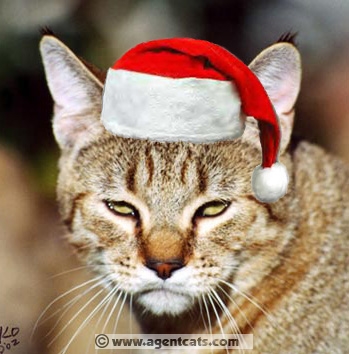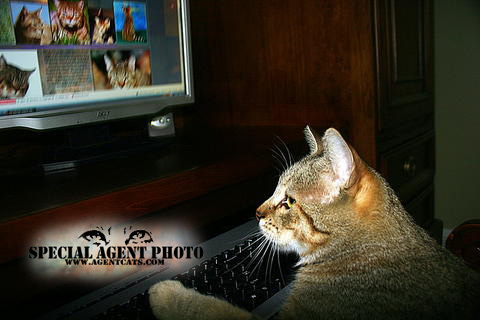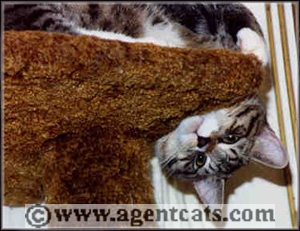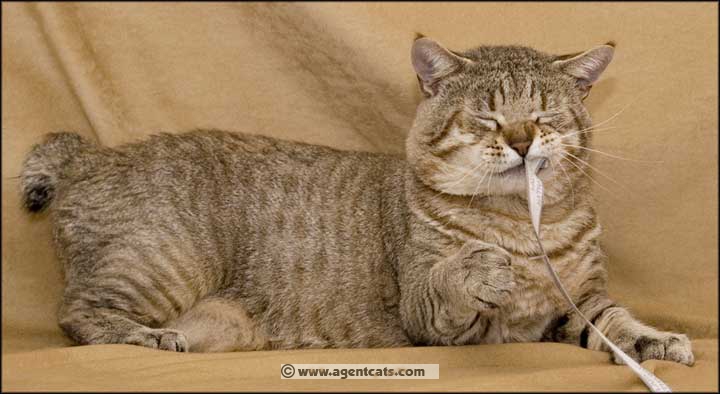Agency Training Course SAF911
PREPARE FOR EMERGENCIES AND AVOID HAZARDS
There are several Animal Poison hotlines. Most are staffed with knowledgeable professionals 24 hours a day, 365 days a year. You should have a number available before you need it. Most hotlines charge per case, so have a credit card available when you call. You don't want to waste precious minutes when your pets life is in the balance. Here is a number you might keep on file.
| ASPCA Animal Poison
Control Center Info and free magnet 1-888-426-4911 Poison Emergencies 1-888-426-4435 |
Page Index - Go directly to:
Harmful Household Items
|
TOP 10 most frequent feline exposures reported to the ASPCA Animal Poison Control Center:
1.) Canine Permethrin Insecticides
(flea treatments for dogs)
2.) Other Topical Insecticides (Flea treatments such as Bio Spot, Hartz,
Zodiac, etc.)
3.) Venlafaxine (antidepressant AKA Effexor, Effexor XR)
4.) Glow Jewelry & Sticks
5.) Lilies
6.) Liquid Potpourri
7.) Non-Steroidal Anti-Inflammatory Drugs (Aspirin, Ibuprofen &
Naproxen)
8.) Acetaminophen (Tylenol, Nyquil, cold medications, etc.)
9.)Anticoagulant Rodenticides (Rat & Mouse Poisons)
10.) Amphetamines (diet medications, ADD medications, illegal drugs,
etc)
Cats love shiny or stringy
objects. Here are a few dangerous items:
|
Antidepressants Vitamins Bleach Diet Pills Disinfectants Fabric Softener Glow Sticks/Jewelry Jewelry Lead Lighter Fluid Mothballs Liquid Potpourri Lime/Scale remover Appliances (Clothes Washers, Dryers, Refrigerators, Freezers, Dishwashers, etc.) |
Small balls Batteries Bread Twist Ties Buttons Coins Cotton Swabs Glass Hair Pins Nylons Paper Clips Plastic Wrap Plastic Bags Rubber-Bands Sharp Objects Silica |
Non-steroidal,
anti-inflammatory medications Acetaminophen Cold & Flu medications Insecticides, Fly, Slug and Snail Baits Rat & Mouse Bait Prescription Medications Solvents (paint thinner, etc.) & Detergents Flea and Tick Products Drain & Oven Cleaners Tobacco Products Candles Electrical Cords |
|
Stringy Items, such as: String that binds turkey carcass, thread, yarn, fishing line, cassette tapes, ribbon, dental floss, tinsel, and the like.
NEVER PULL ANY STRING
FROM THE MOUTH/THROAT OR RECTUM. |
||
Poisonous Plants or Plants hat can cause trouble:
(Most Lilies and Ferns are bad for your cat)
|
Almond Aloe Vera Amarylis (bulb) American Bittersweet Andromeda Japonica Apple Apple Leaf Croton Apricot Arrowgrass Asian (Asianic) Lily Asparagus Fern Australian Nut Autumn Crocus Avocado Azalea Baby's Breath Balsam Bayonet Belladonna Bird of Paradise Bittersweet Black-Eyed Susan Black Locust Bleeding Heart Bluebonnet Branching Ivy Buckeye Buddhist Pine Buttercup Cactus Caladium Calla Lily Castor Bean Cedar Ceriman Cherry Chinaberry Christmas Catus Christmas Rose Chrysanthemum Clematis Cordatum Cornflower Corn Plant Corydalis Cycads Cyclamen Daffodil Daylily Deadly Nightshade Delphinium Devil's Ivy |
Diffenbachia Dumbcane Easter Lily Eggplant Elderberry Elephant Ears Emerald Fern English Ivy Eucalyptus European Bittersweet Evergreen Ferns Fiddle-Leaf Fig Fiddle-Leaf Philodendran Flax Florida Beauty Foxglove Geranium German Ivy Gold Dust Dracaena Glacier Ivy Gladiolas Golden Chain Golden Pathos Heavenly Bamboo Hemlock Holly Honeysuckle Hurricane Plant Hyacinth Hydrangea Iris Iris Ivy Jack-in-the-Pulpit Jasmine Java Beans Jerusalem Cherry Jimson Weed Jonquil Jungle Trumpets Juniper Kalanchoe Lantana Larkspur Laurel Lilies (all Lilium species) Lily of the Valley Lupine Marble Queen Marigold Marijuana Mistletoe Morning Glory |
Mother-In-Law's Tongue Mountain Laurel Mushrooms Narcissus (bulb) Needlepoint Ivy Nephthytis Nightshade Oleander Onion Oriental Lily Panda Peace Lily Peach (kernel, leaves and twigs toxic) Peony Periwinkle Philodendron Poinsettia Poison Hemlock Poppy Potato Pothos Precatory Bean (Rosary Pea) Primrose Privit Red Emerald Red Princess Rhododendron Rhubarb Ribbon Plant Rosary Pea (Precatory Bean) Sago Palm Satin Pathos Schefflera Snowdrops Star of Bethlehem Stargazer Lily Striped Dracaena Sweetheart Ivy Sweet Pea Taro Vine Tiger Lily Tobacco Tomato Plant Tulip Virginia Creeper Water Hemlock Weeping Fig Wild Black Cherry Wisteria Yellow Jasmine Yew Yucca |
|
|
||
|
Alcoholic Beverages Avocado Chocolate (all forms) Coffee (all forms) Fatty Foods Garlic |
Grapes Gum, Candies, foods sweetened with Xylitol Macadamia Nuts Moldy/Spoiled Foods Onions & Onion Powder Potato (Leaves & Stems) |
Raisins Raw Yeast Dough Salt Tea/Tea Leaves Tomato (leaves, stems & green fruit) |
Hazards usually found outside the home:
| Algae Antifreeze/Coolant Fire Pit/Grill Fences, Gates or Deck Lattice De-icing Salts Solvents Compost |
Gasoline Oil Pesticides Cocoa Bean Shell Mulch Fertilizer Swimming Pool / Hot Tub Paint Thinner Open Trash Containers |
Alcohol - Alcoholic beverages are toxic to pets and should never be given to them.
VALENTINE'S DAY
Flowers & Candy - Many types of plants and flowers are
harmful if ingested. Chocolate can cause vomiting, diarrhea,
hyperactivity, abnormal heart rhythm, tremors and seizures, and, in
sever cases, can be fatal.
EASTER
Fake Grass & Small Toys - Can cause choking and intestinal
blockage.
Lilies - Toxic to cats.
4TH OF JULY
Fireworks - Can scare and injure pets and can be toxic.
Can also frighten your pets enough to run or bolt out of doors.
HALLOWEEN
Open Doors - Offers more opportunity for animal to get
out.
Candles - Curiosity to explore flame could cause a burn,
or a fire if candle is knocked over.
THANKSGIVING
Bones - Pet can choke. Also, splintered bones can do
intestinal damage.
Hot Containers - The smells of your meals could entice
animals to get too close when smelling and get burned.
 CHRISTMAS
CHRISTMAS
Holiday Plants - Toxic plants include Mistletoe, Christmas
Rose, Holly, Amarylis and lilies.
Ribbons - Ribbon around your pet's neck could cause them
to choke.
Bubbling Lights - Older forms of this decoration may
contain the highly toxic chemical, methylene cloride.
Fire Salts - Contain chemicals that could be harmful to
pets.
Angel Hair (spun glass) - Can be irritating to eyes and
skin, and can cause intestinal damage if ingested.
Christmas Tree Water - Stagnant or treated water can cause
stomach problems if ingested.
Decoration Hooks - Can cause intestinal blockage/damage if
ingested.
Styrofoam - can cause choking or intestinal blockage if
ingested.
Ornaments - can break or be swallowed and cause severe
injury.
Garland or Tinsel - can cause choking or intestinal
blockage/damage if ingested.
Guests - Can feed pets things that can be toxic. Also,
might think it is okay to let your pets outdoors.
NEW YEAR'S EVE
Balloons & Confetti - can cause choking or intestinal
blockage.
Loud Noises - frighten pets and could cause them to flee.
Keep pets in separate, secure room.
Now, Agent Trainees, you have some basics to keep your very Special Agents safe in their environment. Be well and safe.
Go to Special Agent Pixie Bobs & Savannahs web site - www.agentcats.com


